KAYONZA, September 27, 2025 – Smallholder farmers in Rwanda’s Kayonza district are set to receive a significant boost as a new project aims to strengthen the maize and soybean value chains, reduce post-harvest losses, and expand market opportunities for 4,000 farmers.
The pilot phase of the Food and Agriculture Resilience Mission Pillar 3 [FARM P3] was officially launched on 11 September. The US$1.23 million initiative is funded by the International Fund for Agricultural Development [IFAD], in partnership with the Rwanda Agriculture Board [RAB], farmer cooperatives, private sector actors, and development organisations including IDH – The Sustainable Trade Initiative.
The project, based in Kayonza, focuses on delivering practical solutions to persistent challenges such as poor storage, inadequate drying facilities, and limited access to reliable buyers.
Tackling post-harvest losses
In Rwanda, post-harvest maize losses are estimated at nearly 14 percent, largely due to insufficient drying infrastructure and a lack of proper storage. FARM P3 will co-invest in drying shelters for cooperatives and expand access to mobile mechanical dryers for small enterprises. By improving grain quality and reducing moisture content, farmers will be better equipped to meet private-sector standards and command higher prices.
Dr Alexandre Rutikanga, Chief Technical Advisor at the Ministry of Agriculture and Animal Resources [MINAGRI], noted recently that the project contributes to Rwanda’s PSTA 5 Strategy, which aims to develop resilient, inclusive, and market-oriented value chains.
“By reducing post-harvest losses and fostering reliable market linkages, FARM P3 will empower smallholders while creating new investment opportunities for private sector actors,” Rutikanga said.
Dagmawi Habte-Selassie, IFAD Country Director, added: “Through FARM P3, cooperatives, SMEs, and financial institutions will collaborate more strategically to develop win-win partnerships across key value chains.
The project goes beyond training and equipment — it’s about building sustainable business relationships that help smallholder farmers sell more, waste less, and earn more.”
Farmers eager for change
Local farmers in Kayonza have welcomed the initiative. Beatha Manirakiza, President of the Abadatinyurugamba–Miyaga Cooperative, shared how the earlier IFAD-supported Kayonza Irrigation and Integrated Watershed Management Project [KIIWP2] had already improved their productivity.
“Previously, we farmed one hectare and harvested just two tonnes of poor-quality maize due to lack of skills and manure. Now, with training and support, we cultivate 2.5 hectares and harvest between four and 4.5 tonnes,” she said.
“But we still face major challenges in drying our produce. FARM P3 will help close that gap.”
For soybean farmers, the key issue is not drying, but access to market information.
Angelique Ntireberaho, another local farmer, explained that her cooperative was initially unaware of the market value of soybeans. She stressed the need for quality seed, consistent training, and improved information dissemination to help farmers reliably supply the growing demand.
Private sector demand on the rise
Private companies have shown strong interest in sourcing from local farmers. Africa Improved Foods [AIF], a major processor, currently buys only 25–30 tonnes of soybeans per year — far below its demand of 3,000–4,000 tonnes.
“If farmers can grow and aggregate the soybeans, we’ll provide the transport logistics from the farms. Whatever you produce, we will buy,” said Rajesh Singh, AIF’s Procurement and Sustainability Director.
An inclusive business analysis carried out in collaboration with IDH suggests that soybean farming could raise smallholder incomes by 2.3 times over five years — provided farmers adopt good agricultural practices and secure stable markets.
Building resilience
FARM P3 is part of a broader three-pillar global initiative launched by France under the EU Council Presidency to address fragility in global food systems. IFAD is leading the third pillar, which focuses on building resilient and sustainable food systems in Africa.
In addition to Rwanda, FARM P3 is active in Senegal, Sierra Leone, and Zimbabwe, with each country adapting the model to suit local value chains and development needs.
In Rwanda, FARM P3 complements the larger IFAD-funded Kayonza Irrigation and Integrated Watershed Management Project – Phase II [KIIWP2, 2021–2028], which supports over 40,000 households in enhancing food security and climate resilience.
Together, the two projects aim to transform the agricultural landscape in Kayonza, helping farmers produce more, lose less, and earn better incomes.
https://thecooperator.news/cooperative-u-plants-its-flag-in-rwanda/
Buy your copy of thecooperator magazine from one of our country- wide vending points or an e-copy on emag.thecooperator.news
